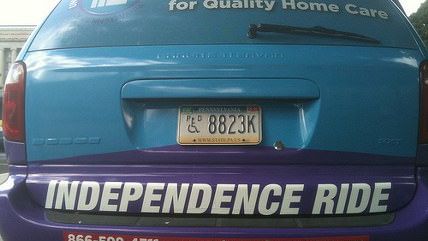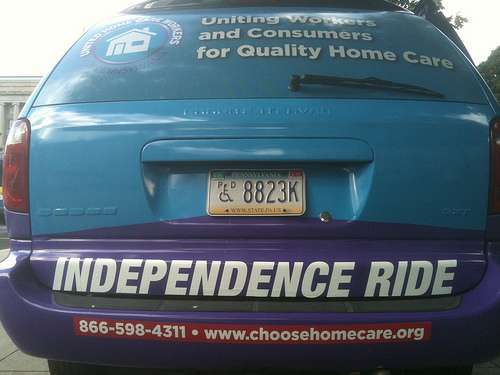Forced Unionization of Home Care Workers Before the Supreme Court
Plaintiffs argue rights to free speech and association violated


The Supreme Court will be hearing today a potentially very important freedom of association case that hasn't gotten a huge amount of publicity as yet, partly because the court decided to take it on while we were in the midst of that scary government shutdown (that wasn't actually all that scary).
Harris v. Quinn plunges deep into the methods that labor unions have been using to survive even as fewer and fewer people seem interested in joining. Namely, government force. In Illinois in 2003 and 2009, the state decided to treat all home-care health workers who received Medicaid subsidies as though they were government employees (though they are still privately employed) and required them to accept Service Employees International Union as their bargaining representative, whether they wanted to or not. They are required to pay dues to the union for this service, regardless of whether they want it or want to be in the union.
A pack of home-care workers are suing, arguing that being forced to pay SEIU for representation violates their First Amendment rights to free speech and association. The Cato Institute (who has a primer on the case here) has submitted a brief (pdf), along with the National Federation of Independent Business and the Michigan-Based, free-market think-tank Mackinac Center, in support of the plaintiffs.
Of note in Cato's argument is that they tackle two of the major arguments that the courts have accepted to allow for compulsory membership in unions at places of government – to preserve "labor peace" (conflicts resulting from multiple bargaining representatives for different employees doing the same work) and to avoid "free riders," those who reap the rewards of collective agreements without contributing to the costs of representation.
It should be fairly obvious that in the case of often self-employed home health workers, these two arguments don't apply. The workers are hired by and work for individuals, and that's not changing. There are no threats to labor peace, nor would there be any free riders. These home care workers all work in the same field but they are in no sense in the same business together. In Cato's brief, they note that this forced unionization is only about lobbying for more pay and benefits, using the union to give "feedback" to the state about rates set by laws. It is offering nothing else. Thus, Cato notes, the state has no actual compelling interest in forcing home care workers into accepting union representation:
Even if compelling "feedback" were a legitimate state interest, the means selected by Illinois are far too blunt. "If the State has open to it a less drastic way of satisfying its legitimate interests, it may not choose a legislative scheme that broadly stifles the exercise of fundamental personal liberties." … In particular, a state may override the freedom of expressive association only where its interests "cannot be achieved through means significantly less restrictive of associational freedoms." … If the State's genuine purpose is to seek feedback from personal assistants, it might survey or interview them or undertake any of a number of far "less drastic" alternatives. It therefore may not command them to assemble for the very purpose of expressive association.
Too long, didn't read version: The state can't force home care workers into unions and make them pay the union money entirely for the purpose of the union lobbying the state to pay the workers more money (some of which will then go back to the union). Instead they could just survey home care workers.
A Washington Examiner piece suggests that this case could be a "sleeper" that could have major consequences. The SEIU president in Illinois, in the subtle, understated language union leaders are known for, told AlJazeera the plaintiffs want to "destroy things for working people in the U.S."
While it's an important case, the complexities of the situation are enough that a pro-free association decision could be written narrowly enough so that it only applies to these privately hired individual workers. It would be a big win for private self-employed people being dragooned into a union for no rational reason but to bolster union ranks, but it may not be the kind of test case some are clearly hoping for.


Show Comments (133)